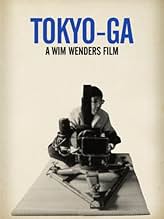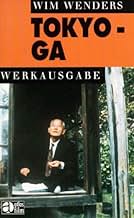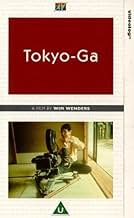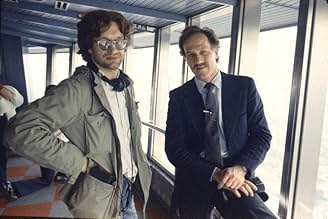Tokyo-Ga
- 1985
- Tous publics
- 1h 32m
IMDb RATING
7.3/10
3.8K
YOUR RATING
Moved by the work of director Yasujirô Ozu, Wim Wenders travels to Japan in search of the Tokyo seen in Ozu's films.Moved by the work of director Yasujirô Ozu, Wim Wenders travels to Japan in search of the Tokyo seen in Ozu's films.Moved by the work of director Yasujirô Ozu, Wim Wenders travels to Japan in search of the Tokyo seen in Ozu's films.
- Director
- Writer
- All cast & crew
- Production, box office & more at IMDbPro
Featured reviews
Wim Wenders' praising, honest, confessional, hurriedly made and rather superficial love letter to the great Japanese filmmaker (and essential influence on WW's work) Yasujiro Ozu. This documentary intermingles some footage of Ozu's Tokyo Monogatari (in a bad copy, which is really a disservice to Ozu's art!); highly reverent interviews with Ozu's signature actor Chishu Ryu and longtime cameraman Yuharu Atsuta, both in their eighties but remarkably keen; and Wenders' own discovery (it's his first time there) of a high-tech, overcrowded, Americanized Tokyo, radically different from WW's preconceived image of an almost provincial post-war Tokyo that he had idealized through Ozu's films.
There are beautiful images by great cameraman Ed Lachman, especially the night shots; but overall it's pretty much familiar territory: trains (old trains, new trains, bullet trains), the overcrowded subway, the concrete jungle, the neon signs, the "copycat" fetishism (fake food, fake golf, fake rock'n'roll), baseball games, the video game mania, Japanese politeness, Japanese formality, Japanese impenetrability. It's a traveling journal, narrated by WW himself, where insightful and obvious remarks come in turns. It's a film with too few highlights (Atsuta's interview, Werner Herzog's maniac speech about his search for "clean, pure images"), and inevitably superficial: like all big towns, Tokyo can't be covered and deciphered by a first-timer; and like all great artists, Ozu's unique universe can't be grasped by a couple of interviews, anecdotes or images. When WW talks about Ozu's art, he's of course telling us about himself and his own cinema.
There's a telling sequence, where WW gets to meet French filmmaker Chris Marker in a Tokyo night-bar called "La Jetée" (the title of Marker's landmark 1962 science-fiction/photo-poem short). Marker - who spent considerable time in Japan over the years -- put Tokyo and Japanese culture at the center of one of the most brilliant personal essays/ journals ever filmed, the incomparable "Sans Soleil" (1982). At one point, WW mentions that "Sans Soleil" is filled with "images of Japan not allowed to foreigners like me". Hence my suggestion: if you want to know more about Ozu, watch his films; if you want to see a revealing, knowledgeable essay by a Westerner on Japan, pass on "Tokyo-Ga" and try "Sans Soleil" instead; if you want a deeply insightful look into WW's work, read the great essay on WW "Eyes Can't Be Bought" by Peter Buchka.
There are beautiful images by great cameraman Ed Lachman, especially the night shots; but overall it's pretty much familiar territory: trains (old trains, new trains, bullet trains), the overcrowded subway, the concrete jungle, the neon signs, the "copycat" fetishism (fake food, fake golf, fake rock'n'roll), baseball games, the video game mania, Japanese politeness, Japanese formality, Japanese impenetrability. It's a traveling journal, narrated by WW himself, where insightful and obvious remarks come in turns. It's a film with too few highlights (Atsuta's interview, Werner Herzog's maniac speech about his search for "clean, pure images"), and inevitably superficial: like all big towns, Tokyo can't be covered and deciphered by a first-timer; and like all great artists, Ozu's unique universe can't be grasped by a couple of interviews, anecdotes or images. When WW talks about Ozu's art, he's of course telling us about himself and his own cinema.
There's a telling sequence, where WW gets to meet French filmmaker Chris Marker in a Tokyo night-bar called "La Jetée" (the title of Marker's landmark 1962 science-fiction/photo-poem short). Marker - who spent considerable time in Japan over the years -- put Tokyo and Japanese culture at the center of one of the most brilliant personal essays/ journals ever filmed, the incomparable "Sans Soleil" (1982). At one point, WW mentions that "Sans Soleil" is filled with "images of Japan not allowed to foreigners like me". Hence my suggestion: if you want to know more about Ozu, watch his films; if you want to see a revealing, knowledgeable essay by a Westerner on Japan, pass on "Tokyo-Ga" and try "Sans Soleil" instead; if you want a deeply insightful look into WW's work, read the great essay on WW "Eyes Can't Be Bought" by Peter Buchka.
Tokyo-Ga is a 1985 documentary film directed by Wim Wenders about filmmaker Yasujiro Ozu. Wenders travels to Japan and narrates the movie as he explores the world of Ozu, alternating scenes where he observes Japan and culture with interviews with crew and cast-members from Ozu's films. Wim Wenders says, "If in our century something sacred still existed
if there were something like a sacred treasure of the cinema, then for me that would have to be the work of the Japanese director, Yasujiro Ozu. He made fifty-four films. Silent films in the Twenties, black-and-white films in the Thirties and Forties, and finally color films until his death on December 12th, 1963, on his sixtieth birthday. As thoroughly Japanese as they are, these films are, at the same time, universal. In them, I've been able to recognize all families, in all the countries of the world, as well as my parents, my brother and myself. For me, never before and never again since has the cinema been so close to its essence and its purpose: to present an image of man in our century, a usable, true and valid image, in which he not only recognizes himself but from which, above all, he may learn about himself. Ozu's work does not need my praise and such a sacred treasure of the cinema could only reside in the realm of the imagination. And so, my trip to Tokyo was in no way a pilgrimage. I was curious as to whether I still could track down something from this time, whether there was still anything left of this work. Images perhaps, or even people
Or whether so much would have changed in Tokyo in the twenty years since Ozu's death that nothing would be left to find.
the footage is lush and gorgeous, German camera-work of the 70s-80s of the highest caliber. but...the content I found ... appalling! it's been 15 or so years since I saw it and haven't thought about it in a long time, but was just reminded while suffering through this documentary about a feature film called "Jew Süss" ... but my impression of the overall tone is ineradicable . . . I have to admit I'd entirely forgotten the "Ozu love letter" element of the whole thing.
more enjoyable is a documentary about designer Yojhi Yamamoto that I saw at about the same time in this big Wim Wenders retrospective. another film that was a very sweet standout was "A Trick of the Light" about film pioneers whose work was eclipsed by developments of Lumiere in France starring Udo Kier, which I recommend highly.
Wim Wenders...is kind of a shallow filmmaker in my estimation. As with Tokyo Ga I'm sure he had no idea what a potentially offensive film he made. I remember particularly a sequence about some sort of Japanese pinball game that is insanely popular there, his reflections upon which seemed the fruit of a (lack of) intelligence of the sort that characterizes also that cinema excreta "Lost in Translation". the deep meaning of which seems to be "god what a bunch of freaks these Japs are for not speaking English and not modeling themselves after the oh so kewl savvy ironic US population what in god's name is wrong with them?!
more enjoyable is a documentary about designer Yojhi Yamamoto that I saw at about the same time in this big Wim Wenders retrospective. another film that was a very sweet standout was "A Trick of the Light" about film pioneers whose work was eclipsed by developments of Lumiere in France starring Udo Kier, which I recommend highly.
Wim Wenders...is kind of a shallow filmmaker in my estimation. As with Tokyo Ga I'm sure he had no idea what a potentially offensive film he made. I remember particularly a sequence about some sort of Japanese pinball game that is insanely popular there, his reflections upon which seemed the fruit of a (lack of) intelligence of the sort that characterizes also that cinema excreta "Lost in Translation". the deep meaning of which seems to be "god what a bunch of freaks these Japs are for not speaking English and not modeling themselves after the oh so kewl savvy ironic US population what in god's name is wrong with them?!
Tokyo-Ga (1985) was written and directed by Wim Wenders. This full-length documentary is a tribute to Japanese director Yasujirô Ozu. It's included as a special feature in the Criterion Collection edition of Ozu's movie Late Spring.
Wenders is a talented German New Age director, who admired Ozu's work. He went to Tokyo to learn more about the city and about Ozu.
The movie has a real dichotomy. Wenders interviews actor Chishû Ryû and cinematographer Yûharu Atsuta at length. Ryû appeared in almost all of Ozu's films, and Atsuta was his chief camera operator.
Each of them (separately) tells the same story. Ozu knew what he wanted, and he was prepared to go to any lengths to get it. Neither man always understood what Ozu was thinking. They did what he told them to do. Sometimes Ozu was happy, sometimes he wasn't. Both men said that they couldn't understand why something was right or wrong. They kept doing the same scene until Ozu was satisfied. So, in a way, Ozu was a tyrant. However, he was a very polite and friendly tyrant, and he directed great film after great film. Both men are firm in their love and admiration for him.
The other part of the film consists of Wenders wandering through Tokyo and ending up at a pachinko parlor, a golf range, and a factory where they make plastic "food" items to be displayed in restaurant windows.
Wenders' view of Tokyo is that it's a harsh, overcrowded city with no charm. That's what he shows us. Of course, no one can capture a city in part of one documentary. Possibly another director would give us a different view.
I think this documentary is worth seeing if you want to learn more about how Ozu worked and how he accomplished as much as he did. It's also interesting to see a foreigner's view of this city of nine million people. It's certainly not a must-see movie, but I'm glad I saw it.
Tokyo-Ga has a solid 7.4 IMDb rating. I thought it was even better than that, and rated it 9.
Wenders is a talented German New Age director, who admired Ozu's work. He went to Tokyo to learn more about the city and about Ozu.
The movie has a real dichotomy. Wenders interviews actor Chishû Ryû and cinematographer Yûharu Atsuta at length. Ryû appeared in almost all of Ozu's films, and Atsuta was his chief camera operator.
Each of them (separately) tells the same story. Ozu knew what he wanted, and he was prepared to go to any lengths to get it. Neither man always understood what Ozu was thinking. They did what he told them to do. Sometimes Ozu was happy, sometimes he wasn't. Both men said that they couldn't understand why something was right or wrong. They kept doing the same scene until Ozu was satisfied. So, in a way, Ozu was a tyrant. However, he was a very polite and friendly tyrant, and he directed great film after great film. Both men are firm in their love and admiration for him.
The other part of the film consists of Wenders wandering through Tokyo and ending up at a pachinko parlor, a golf range, and a factory where they make plastic "food" items to be displayed in restaurant windows.
Wenders' view of Tokyo is that it's a harsh, overcrowded city with no charm. That's what he shows us. Of course, no one can capture a city in part of one documentary. Possibly another director would give us a different view.
I think this documentary is worth seeing if you want to learn more about how Ozu worked and how he accomplished as much as he did. It's also interesting to see a foreigner's view of this city of nine million people. It's certainly not a must-see movie, but I'm glad I saw it.
Tokyo-Ga has a solid 7.4 IMDb rating. I thought it was even better than that, and rated it 9.
I first went to Japan in 1986 as a high school exchange student. I had been studying about Japan for the past 6 years and was very excited to finally go there to see it in person. Wim Wenders was in a similar situation. He had fallen in love with a particular Japanese film-maker Ozu Yasujiru. Wim had been influenced from an early age by Ozu's work, and he decided to go to Japan while in the middle of making "Paris, Texas." During the break in the making of the film in Los Angeles, Wim boarded a 747 and flew across the Pacific to Tokyo, a place he had never been to before. What we get to see when we watch this film, is not only an interview with the cameraman that worked for Ozu for 25 years, but also Wim's personal discovery of Japan. Much of the film is just straight documentary-type footage accompanied with some pretty weird music. Riding in a taxi at night. Riding in a train at night. Following a little boy who is too tired to walk in the underground shopping mall with his mom, and decides to just sit down. The Cherry Blossom Festival picnics in Tokyo, the dancers at Harajuku on Sundays. A particularly fascinating scene is of a company that manufactures the wax food models you see outside most restaraunts in Japan. Overall, a wonderful film for anyone who loves Japan or is just interested in it. I rate this film among Wim's best works. If you can find it, rent it.
Did you know
- Quotes
Wim Wenders: It felt good just to look out the window. If only it were possible to film like that, I thought to myself, like when you open your eyes sometimes just to look without wanting to prove anything.
- ConnectionsFeatured in De zee die denkt (2000)
- How long is Tokyo-Ga?Powered by Alexa
Details
Contribute to this page
Suggest an edit or add missing content












